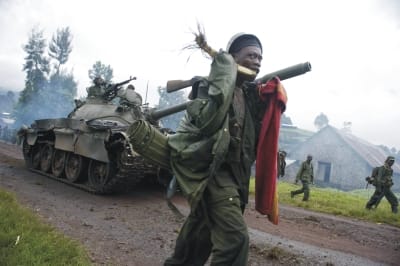Thousands of protesters attack UN in E Congo

Congolese army soldiers withdraw from Kibumba about 35km north of the provincial capital Goma yesterday. Thousands of Congolese fled to Goma from Rugari and from the Kibumba Internally Displaced Peoples (IDP) camp after violence started between forces loyal to renegade general Laurent Nkunda and the Congolese army. Photo: AFP
Thousands of protesters attacked the United Nations' eastern Congo headquarters yesterday, expressing anger that a UN peacekeeping force has been unable to protect them from a rebel attack that has forced tens of thousands to flee.
Protesters lobbied stones and rocks over the wall surrounding the UN offices in the provincial capital of Goma. UN spokeswoman Sylvie van den Wildenberg said cars were being damaged and windows were being shattered.
Meanwhile, soldiers fled fighting in what appeared to be a major retreat of government forces being attacked by rebels of renegade Gen. Laurent Nkunda.
Reporters watched the soldiers struggle to make a way through thousands of refugees also fleeing along the main road south from a major army base seized by rebels toward Goma.
Back-to-back wars in Congo spilled into half a dozen neighbouring countries and destroyed much of Congo itself by 2002. But fighting has continued in the east, where several militias operate.
Earlier rebels in the Democratic Republic of Congo were reported Sunday to have seized a national park in the east of the country that is home to more than a quarter of the world's surviving mountain gorillas.
"Rebels loyal to dissident general Laurent Nkunda took over the headquarters of the Virunga National Park and the sector where the gorillas are to be found after heavy fighting with the DRC army in the early hours of the morning," a statement received by AFP from the park said.
"More than 50 rangers were forced to flee through the forest."
"The taking of our headquarters at Rumangabo by the rebels is unprecedented in all these years of fighting," said park director Emmanuel de Merode in the statement.
The park, which has a rich variety of animal life and is a Unesco World Heritage Site, is home to 200 of the world's surviving 700 mountain gorillas. It lies on the border with Rwanda and Uganda.
Fighters engaged in the fighting in the Nord-Kivu province regularly take refuge in the park, killing wild animals and chopping down trees for fuel.
"The military camp of Rumangabo is again under the control of the CNDP, as are the localities of Kalengera and Rugari," a statement from Nkunda's rebel National Congress for the Defence of the People (CNDP) said earlier.
The camp is an important army base in Nord-Kivu, about 50 kilometres (30 miles) north of the provincial capital Goma.
"The CNDP took Rumangabo after fighting Sunday morning and clashes are continuing at Rugari," a spokesman for the UN's DRC peacekeeping mission MONUC told AFP. There were no details of any casualties.
An AFP correspondent in Rugari, 10 kilometres (six miles) south of Rumangabo on the road to Goma, reported that heavy artillery exchanges were continuing.
The rebels said they had taken the Rumangabo camp -- which they captured earlier this month and later abandoned at MONUC's request -- as a "riposte" against the "generalised attacks on all fronts by the government coalition."
The said the coalition was made up of government troops, the Democratic Forces for the Liberation of Rwanda (FDLR), a group composed of Hutu former militia fighters who fled Rwanda after the 1994 genocide, and local militias.
For its part, the government charged in a statement that "two foreign battalions" backed up the rebels in the attack on Rumangabo.
The DRC government says the CNDP, led by a renegade DRCongo general Laurent Nkunda, a Tutsi, has military backing from neighbouring Rwanda.
Fighting that broke out between the two sides in August -- violating a January ceasefire treaty -- has displaced some 200,000 people, the United Nations food aid agency warned Friday.
The latest developments follow a recent call by the UN Security Council for a ceasefire in the region, a theatre of conflict since the 1994 Rwanda genocide.

 For all latest news, follow The Daily Star's Google News channel.
For all latest news, follow The Daily Star's Google News channel. 



Comments